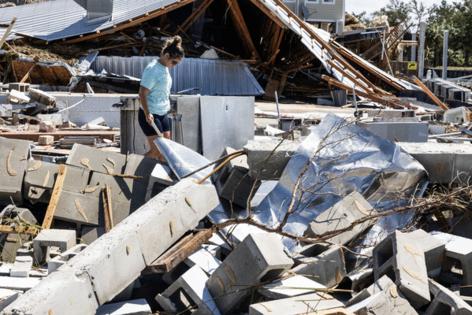Commentary: Could going vegan protect you from a hurricane?
Published in Op Eds
Just two weeks after Hurricane Helene made landfall in Florida as a Category 4 storm, carving a trail of destruction and causing at least 227 deaths throughout six states, Hurricane Milton pummeled Sarasota, Florida, where I live, with Category 3 winds of more than 100 mph.
Like many other people in the state, I lost power and cell phone service. But I was fortunate. Some residents watched their houses fill with rushing floodwater as they spent the night on their kitchen counters, and others evacuated only to return and find that they no longer had a home. Portions of the roof even blew off Tropicana Field, the Tampa Bay Rays’ baseball stadium in St. Petersburg.
At least 22 people died due to Hurricane Milton. It was the worst disaster to hit Florida that I can remember, producing a near-record storm surge and spinning off a historic rash of deadly tornadoes. Scientists estimate that it may have caused roughly twice as much property damage as it would have if the world were devoid of human-caused climate change.
The gusts practically toppled parts of my neighborhood. I had to hire a contractor to put my fence back up, get rid of a broken lamppost and reassemble some furniture. Not far from me is Babcock Ranch, a new community that was built to withstand climate-driven winds. More than 2,000 people safely rode out the storm there, and some suspect that similar residential developments will be necessary for Florida residents to survive similar storms in the future.
Turning every Florida community into another Babcock Ranch is a tall (not to mention costly) order, and there’s a much simpler way to create a safer, more livable world — not to mention a healthier, kinder one: going vegan. And November, which is World Vegan Month, is a fitting time to do it.
According to a new study by an international group of researchers, in order to balance the increase in global greenhouse gas emissions related to food production, those emissions must be reduced in countries where people eat a lot of meat and other animal-based foods, including the U.S., Brazil, Australia and European countries where consumption is above the worldwide average. A separate research project determined that Western countries will have to slash their consumption of animal flesh by 90% to reduce global heating to acceptable levels.
Going vegan by yourself — or even with a few friends — won’t change the weather. But if we all go vegan, we can change the climate. Even if people were to eat vegan only part-time, it would have some effect. Scientists believe that if everyone were to substitute 50% of the meat and cow’s milk they consume with plant versions, emissions from agriculture could decline by 31%.
That’s not bad, but imagine what a difference it would make for the planet, animals and human health if everyone went — and stayed — vegan. We have an environmental impact — and an impact on animals — every time we eat, so let’s make it a good one through compassionate, sensible choices.
The dairy industry is responsible for 3.4% of global human-induced greenhouse gas emissions — and that’s more than aviation. Using a vegan egg replacer instead of hens’ eggs could reduce a bakery’s carbon footprint by as much as 72%. Researchers at the University of Oxford have found that vegans are responsible for emissions of about 75% less climate-heating gas than people who eat a lot of meat.
So let’s make smarter choices in honor of World Vegan Month. We don’t need to pick between enjoying our favorite foods or living in our favorite places on the planet. With tasty plant versions of every food imaginable, we can go vegan and do both.
___
©2024 Tribune Content Agency, LLC.




























































Comments